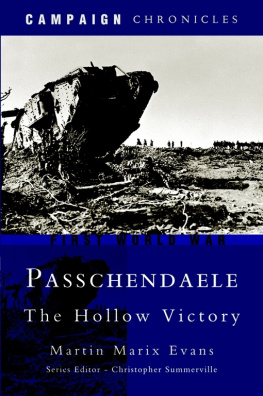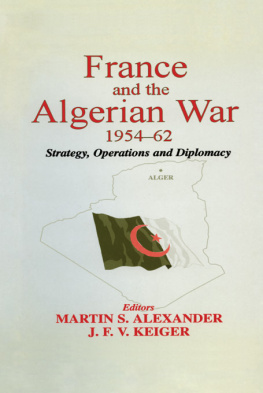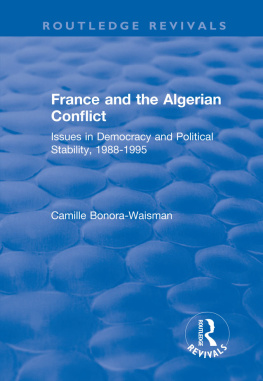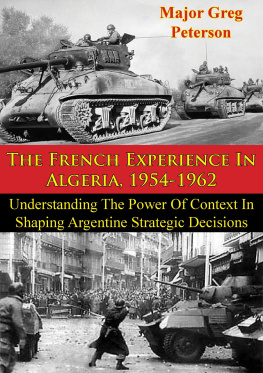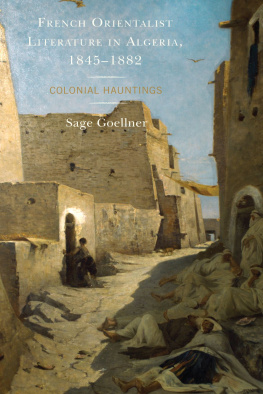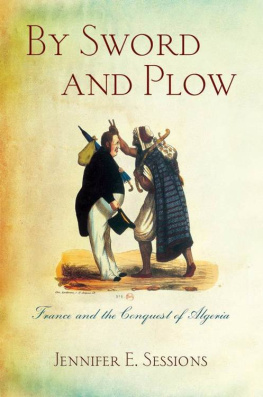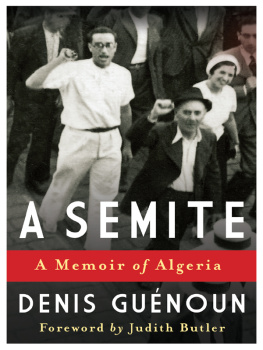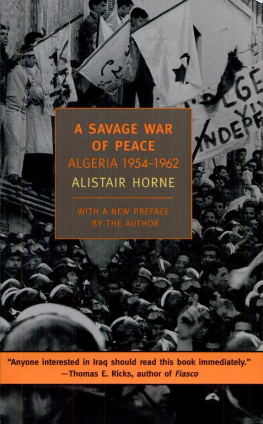ALGERIA
THE MAKING OF THE MODERN WORLD
This group of narrative histories focuses on key moments and events in the twentieth century to explore their wider significance for the development of the modern world.
PUBLISHED
The Fall of France: The Nazi Invasion of 1940, Julian Jackson
A Bitter Revolution: Chinas Struggle with the Modern World, Rana Mitter
Dynamic of Destruction: Culture and Mass Killing in the First World War, Alan Kramer
Sharpeville: An Apartheid Massacre and its Consequences, Tom Lodge
Algeria: Frances Undeclared War, Martin Evans
SERIES ADVISERS
PROFESSOR CHRIS BAYLY, University of Cambridge
PROFESSOR RICHARD J. EVANS, University of Cambridge
PROFESSOR DAVID REYNOLDS, University of Cambridge
ALGERIA: FRANCES UNDECLARED WAR
MARTIN EVANS


Great Clarendon Street, Oxford OX2 6DP
Oxford University Press is a department of the University of Oxford.
It furthers the Universitys objective of excellence in research, scholarship, and education by publishing worldwide in
Oxford New York
Auckland Cape Town Dar es Salaam Hong Kong Karachi
Kuala Lumpur Madrid Melbourne Mexico City Nairobi
New Delhi Shanghai Taipei Toronto
With offices in
Argentina Austria Brazil Chile Czech Republic France Greece
Guatemala Hungary Italy Japan Poland Portugal Singapore
South Korea Switzerland Thailand Turkey Ukraine Vietnam
Oxford is a registered trade mark of Oxford University Press in the UK and in certain other countries
Published in the United States
by Oxford University Press Inc., New York
Martin Evans 2012
The moral rights of the author have been asserted
Database right Oxford University Press (maker)
First published 2012
All rights reserved. No part of this publication may be reproduced, stored in a retrieval system, or transmitted, in any form or by any means, without the prior permission in writing of Oxford University Press, or as expressly permitted by law, or under terms agreed with the appropriate reprographics rights organization. Enquiries concerning reproduction outside the scope of the above should be sent to the Rights Department, Oxford University Press, at the address above
You must not circulate this book in any other binding or cover and you must impose the same condition on any acquirer
British Library Cataloguing in Publication Data
Data available
Library of Congress Cataloging in Publication Data
Data available
Typeset by SPI Publisher Services, Pondicherry, India
Printed in Great Britain
on acid-free paper by
Clays Ltd, St Ives Plc
ISBN 9780192803504
1 3 5 7 9 10 8 6 4 2
To Abdul with love

Contemporary Algeria and France
Acknowledgements
Bordj Bou Arreridj is a small city of 169,009 inhabitants in eastern Algeria. Well known for its food and hospitality, Bordj is situated in the midst of a countryside that produces the bulk of the countrys wheat and barley: hence the areas nickname as Algerias bread basket. To walk down the streets of Bordj Bou Arreridj, as I did in April 2010, is to feel the hand of history. There is a museum dedicated to the veterans who fought against the French between 1954 and 1962; a cemetery for the fallen martyrs; a monument to the national liberation struggle; a statute commemorating Mohammed El-Mokrani who led a huge revolt in the region against the French in 1871. In this manner Bordj Bou Arreridj is typical. Every village, town, and city in Algeria has the same type of monuments: an ever-present public memory that is encapsulated in the massive memorialthe 97-metre-high Riad-El-Feththat dominates the Algiers skyline. Inaugurated on 5 July 1982, exactly twenty years after independence from the French, at the base of the abstract monument are three huge male bronze figures, proud and defiant, which represent popular resistance to the French occupation; the National Liberation Army; and the present Popular National Army. Underneath the monument, the Museum to the National Liberation Struggle climaxes with a domed room, decorated in gilded verses from the Quran, that contains a single illuminated stone: the symbol of the unity of the Algerian people and its heroic resistance.
In contrast, across the Mediterranean in France, there is no equivalent public memory. Unlike World War One, or the World War Two Resistance, public monuments have been local, piecemeal affairs. Those that exist are the result of pressure from below by specific communities who want recognition of how they suffered during the Algerian War. Significantly, too, the diversity of these monuments is testament to the ongoing memory war over Algeria within contemporary France. Thus, in Paris we can find a Place Maurice Audin dedicated to the memory of an Algerian Communist Party member who disappeared at the hands of French paratroopers in Algiers in 1957 and a plaque on the Pont Saint Michel bridge to Algerians who were murdered by French police there on 17 October 1961. While in Aix-en-Provence there is Place Bachaga Boualam, marking the life of the most prominent pro-French Algerian from the late 1950s, and in Nice a memorial to the French settlers which also includes a plaque to fallen members of the extremist pro-French Algeria organization the Organisation Arme Secrte (OAS) who are called the martyrs of French Algeria.
Two different patterns of remembering; measures of the enduring significance of the subject of this book, namely the origins, experience and legacy of the Algerian War of Independence 1954 to 1962a seminal event in twentieth-century world history. As such the book will be dealing with broad issuescolonialism, nationalism, war, the impact of transnational idealsbut it will also be attuned to the particularities of Algerian history: a combination of the generic and specific that is absolutely vital in understanding the Arab world as this region experiences the tumultuous events of the Arab Spring.
In completing this book I must first thank the British Academy which awarded me a Leverhulme Senior Fellowship in 20078. In addition the British Academy also financed fieldwork in France, participation in the Rud Seminar on French History in Adelaide in 2006, and a three-year project on an oral history of Algerian and Senegalese veterans from the Algerian War of Independence (Oral history across generations: a research programme with the universities of Dakar and Algiers, ). In the last case this facilitated workshops at the Universities of Algiers and Dakar in 2010 and 2011 that produced fascinating insights into the complexities of memory and history in contemporary Africa. Equally I must thank the Arts and Humanities Research Council which financed the research leave that allowed me to write up the bulk of this book. And finally I must thank the Centre for European and International Studies Research at the University of Portsmouth which generously financed research trips to Algeria, Belgium and France.
In terms of colleagues I must thank Megan Vaughn who first approached me with the idea for this book on the advice of Mark Mazower. Thereafter I could not have begun to trace the long and complex history of Algeria without the ideas of stimulating colleagues at the University of Portsmouth, above all Walid Benkhaled, Tony Chafer, Emmanuel Godin, and Natalya Vince, each of whom commented on the manuscript. Equally, writing this book gives me a chance to thank a generation of graduate students at PortsmouthEnrico Cernigoi, Marianne Durrand, Fiona Haig, Manus McGrogan, Tobias Reckling, Monica Riera, and Jo Warsoneach of whom has brought new understandings to the vital realism of contemporary history, as well as those final-year students in the School of Languages and Areas Studies who took my final-year option in Algerian history and participated in the annual Algeria workshops. Again this teaching experience has done so much to deepen my knowledge and understanding of the subject.
Next page

